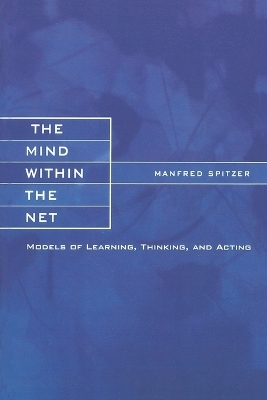
The Mind within the Net
Models of Learning, Thinking, and Acting
Seiten
2000
Bradford Books (Verlag)
978-0-262-69236-6 (ISBN)
Bradford Books (Verlag)
978-0-262-69236-6 (ISBN)
- Lieferbar
- Versandkostenfrei
- Auch auf Rechnung
- Artikel merken
A highly readable, non-mathematical introduction to neural networks-computer models that help us to understand how we perceive, think, feel, and act.
How does the brain work? How do billions of neurons bring about ideas, sensations, emotions, and actions? Why do children learn faster than elderly people? What can go wrong in perception, thinking, learning, and acting? Scientists now use computer models to help us to understand the most private and human experiences. In The Mind Within the Net, Manfred Spitzer shows how these models can fundamentally change how we think about learning, creativity, thinking, and acting, as well as such matters as schools, retirement homes, politics, and mental disorders.
Neurophysiology has told us a lot about how neurons work; neural network theory is about how neurons work together to process information. In this highly readable book, Spitzer provides a basic, nonmathematical introduction to neural networks and their clinical applications. Part I explains the fundamental theory of neural networks and how neural network models work. Part II covers the principles of network functioning and how computer simulations of neural networks have profound consequences for our understanding of how the brain works. Part III covers applications of network models (e.g., to knowledge representation, language, and mental disorders such as schizophrenia and Alzheimer's disease) that shed new light on normal and abnormal states of mind. Finally, Spitzer concludes with his thoughts on the ramifications of neural networks for the understanding of neuropsychology and human nature.
How does the brain work? How do billions of neurons bring about ideas, sensations, emotions, and actions? Why do children learn faster than elderly people? What can go wrong in perception, thinking, learning, and acting? Scientists now use computer models to help us to understand the most private and human experiences. In The Mind Within the Net, Manfred Spitzer shows how these models can fundamentally change how we think about learning, creativity, thinking, and acting, as well as such matters as schools, retirement homes, politics, and mental disorders.
Neurophysiology has told us a lot about how neurons work; neural network theory is about how neurons work together to process information. In this highly readable book, Spitzer provides a basic, nonmathematical introduction to neural networks and their clinical applications. Part I explains the fundamental theory of neural networks and how neural network models work. Part II covers the principles of network functioning and how computer simulations of neural networks have profound consequences for our understanding of how the brain works. Part III covers applications of network models (e.g., to knowledge representation, language, and mental disorders such as schizophrenia and Alzheimer's disease) that shed new light on normal and abnormal states of mind. Finally, Spitzer concludes with his thoughts on the ramifications of neural networks for the understanding of neuropsychology and human nature.
| Reihe/Serie | A Bradford Book |
|---|---|
| Verlagsort | Massachusetts |
| Sprache | englisch |
| Maße | 152 x 229 mm |
| Gewicht | 567 g |
| Themenwelt | Geisteswissenschaften ► Psychologie ► Allgemeine Psychologie |
| Geisteswissenschaften ► Psychologie ► Verhaltenstherapie | |
| Informatik ► Theorie / Studium ► Künstliche Intelligenz / Robotik | |
| ISBN-10 | 0-262-69236-8 / 0262692368 |
| ISBN-13 | 978-0-262-69236-6 / 9780262692366 |
| Zustand | Neuware |
| Haben Sie eine Frage zum Produkt? |
Mehr entdecken
aus dem Bereich
aus dem Bereich
Buch | Softcover (2024)
REDLINE (Verlag)
CHF 27,95
Eine kurze Geschichte der Informationsnetzwerke von der Steinzeit bis …
Buch | Hardcover (2024)
Penguin (Verlag)
CHF 39,20


